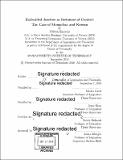Embedded jussives as instances of control : the case of Mongolian and Korean
Author(s)
Sisovics, Milena
DownloadFull printable version (12.81Mb)
Other Contributors
Massachusetts Institute of Technology. Department of Linguistics and Philosophy.
Advisor
Martin Hackl, Irene Heim and Norvin Richards.
Terms of use
Metadata
Show full item recordAbstract
This dissertation is an investigation into the semantics of imperatives and imperative-like forms (collectively referred to as jussives) in embedded contexts. The long-held view that imperatives are confined to root (matrix) contexts has been challenged by recent findings of counterexamples from a variety of languages. This thesis contributes to the debate by introducing novel empirical evidence from Mongolian confirming that the restriction on imperative embedding is not universal: Mongolian is shown to allow for embedding of a a speaker-directed jussive form voluntative and a hearer-directed imperative. The empirical domain is widenend to include data from jussive embedding in Korean (drawing on Madigan 2008, Pak et al. 2008b, a.o.). This thesis takes special interest in the complex combination of properties characterizing the subjects of embedded jussives in Mongolian and Korean, to wit, (i) their dependence on an antecedent in the embedding clause, (ii) the requirement to be interpreted de se, and (iii) the presence of [phi]-features. These properties are used to make a case for an analysis of jussive subjects as instances of Obligatory Control PRO, and against an analysis as indexical pronouns. In particular, it is demonstrated how a view of PRO as a syntactically and semantically complex unit closely resembling de re expressions in attitude reports (Percus & Sauerland 2003a) provides an elegant way of accounting for the combined characteristics of jussive subjects. Set against the background of a Neo-Davidsonian event semantics, this thesis puts forward the idea that jussive clauses denote sets of events whose propositional content amounts to a desire statement. An analysis of jussives as sets of events is shown to afford a natural extension to matrix occurrences on the assumption that the content denoted by matrix jussives is anchored to the speech event. Finally, this thesis proposes to bridge the gap between jussive reports and canonical Obligatory Control constructions and demonstrates how the presented account can be generalized to provide a novel perspective on Obligatory Control constructions as well.
Description
Thesis: Ph. D. in Linguistics, Massachusetts Institute of Technology, Department of Linguistics and Philosophy, 2018. Cataloged from PDF version of thesis. Includes bibliographical references (pages 179-185).
Date issued
2018Department
Massachusetts Institute of Technology. Department of Linguistics and PhilosophyPublisher
Massachusetts Institute of Technology
Keywords
Linguistics and Philosophy.